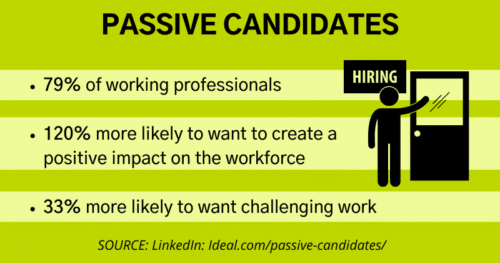How To Engage Passive Candidates in a Tight Labor Market

What a difference a year makes. Reflect back to February of 2020 when we were experiencing a strong labor market and overall unemployment of 3.5%, the lowest level in 50 years. Then, suddenly we were facing a pandemic, displacing millions of people from their jobs. In March and April of 2020, unemployment reached 14.8%.
While unemployment numbers increased, the reality of the professional employment market continued to feel tight. In January of 2021, the unemployment rate was 6.3% and 6.2% in February. Federal Reserve Chairman, Jerome Powell, recently said that the real unemployment rate is closer to 10%. Yet business leaders are having trouble finding talent, an issue we are clearly seeing play out within our own client base.
WHY ARE EMPLOYERS HAVING TROUBLE FINDING TALENT?
There are a variety of reasons that account for the difficulty in finding talent:
- Lack of skills for open positions
- Fear of changing roles
- Childcare challenges
- Preference to collect unemployment insurance over earning wages
Instead of focusing on unemployment stories in the press, employers should focus on targeting the talent needed to grow the business. Your talent strategy should highlight the critical skills your organization needs. Without it, you may find a candidate to fulfill today’s urgent need, but not the candidate who will accelerate your business objectives.
How to Win the Talent War
Given the current candidate market conditions, how can you win the talent war? Posting and waiting for job seekers to reply will be a lost cause. In this market, most candidates are busy focusing on their current roles. They are not actively job seeking, watching the job market, or responding to job postings.
To be successful in attracting talent today, you need to target passive candidates. A much more challenging, but rewarding, task because these people are not looking to make a career change. It requires a very targeted outreach to candidates based on skills, experiences, companies, certifications, connections and more. Unless you specifically target them for a discussion, they would not otherwise hear about your opportunity.
Why go through the effort?
Research by LinkedIn on passive candidates finds:
- 79% of working professionals are passive candidates
- These professionals are 120% more likely to want to create a positive impact on the workforce
- They are 33% more likely to want challenging work
** Source: https://ideal.com/passive-candidates/
How to Engage the Passive Candidate
To engage the passive candidate, a company’s reputation is extremely important. You have to stand out from the crowd and get targeted candidates interested enough to engage in a discussion. Customize your messaging, showcase your employer brand, emphasize your culture and share an opportunity profile that encompasses more than just a job description. Candidates want to hear a compelling story about how you think they fit into the mission, the impact they could make, and where this role can take them.
Passive candidate outreach allows you to highlight what might be different about your opportunity and company that may be missing in that person’s current job. Maybe you present an opportunity for advancement, better work-life balance, culture, or benefits. Candidates also feel more inclined to respond because they feel flattered that you have identified them as a potential fit.
The best employers are prepared not just to fill a gap, but target the best talent to propel the organization forward. If you would like to discuss strategies to target passive candidates, connect with us at Recruiting@fahrenheitadvisors.com.
about the Author
 Amanda Maino is a skilled human resources professional with expertise in recruiting, developing, and engaging employees across a variety of industries including professional services, higher education, transportation, and technology. Her broad understanding of human resources issues combined with a focus on benefits, compensation, and wellness programs allows her to implement Fahrenheit’s strong, customized hiring process. She partners with clients to understand their business, industry, and culture and then strategically sources qualified candidates.
Amanda Maino is a skilled human resources professional with expertise in recruiting, developing, and engaging employees across a variety of industries including professional services, higher education, transportation, and technology. Her broad understanding of human resources issues combined with a focus on benefits, compensation, and wellness programs allows her to implement Fahrenheit’s strong, customized hiring process. She partners with clients to understand their business, industry, and culture and then strategically sources qualified candidates.
